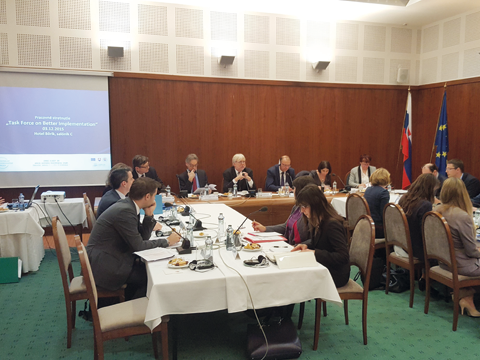A team set up to help a number of Member States use EU funds more efficiently has completed its intensive work schedule, which included more than 100 technical meetings and seminars. In cooperation with eight countries, the Task Force for Better Implementation (TFBI) has eased bottlenecks and backlogs in the allocation and spending of EU Structural Funds. The TFBI started work in November 2014 to assess why Bulgaria, Croatia, Czech Republic, Italy, Romania, Slovakia, Slovenia and Hungary were la
Task Force promotes better use of EU funding
- 31 March 2016

A team set up to help a number of Member States use EU funds more efficiently has completed its intensive work schedule, which included more than 100 technical meetings and seminars. In cooperation with eight countries, the Task Force for Better Implementation (TFBI) has eased bottlenecks and backlogs in the allocation and spending of EU Structural Funds.
The TFBI started work in November 2014 to assess why Bulgaria, Croatia, Czech Republic, Italy, Romania, Slovakia, Slovenia and Hungary were lagging behind in delivering funding through programmes and on to projects. In addition to identifying bottlenecks, the TFBI collaborated with national authorities to draw up action plans to get things moving.
The whole process benefited from strong political support in both the Commission and the Member States. The goal was to provide each of the countries involved with tailored and coordinated methods of improving implementation so that the 2007-2013 programming period could come to a successful close.
Driving change
The Task Force set about its work by systematically screening EU-supported programmes, priorities and even individual projects where necessary. Then, activities were identified which could speed up implementation and be rolled into the Member States’ action plans – all of which were agreed in spring 2015. The action plans were drafted to include quantifiable milestones and targets, and progress was monitored on a bimonthly or quarterly basis.
The TFBI’s work has led to adjustments in a number of programme and project timetables. Some projects have been phased over two programming periods which means they can now be implemented fully during 2014-2020. In addition, new major projects have been identified and submitted. Allocations for financial instruments have been increased and the Member States concerned can now apply greater flexibility when declaring additional expenditure.
The process also delivered a range of capacity-building exercises, including seminars, workshops and technical meetings with national authorities, where good practice was exchanged. Although the TFBI finished its work at the end of 2015, the Commission will continue to provide assistance and organise similar events for Member States as they deliver programmes for the 2014-2020 funding period.
Learning curve
While many of the issues addressed by the TFBI were specific to individual Member States, there were some common causes for the delays, including:
- some programmes started slowly;
- insufficient preparation for complex infrastructure projects;
- long project cycles;
- overly lengthy national administrative procedures;
- a lack of administrative capacity at national and beneficiary level; and
- errors in public procurement procedures.
There was also some suggestion that programme implementation has been a steep learning curve for all Member States, especially those undertaking their first full programming period. For 2014-2020, the recommendation is that all national authorities should start their programme implementation measures as soon as possible.
To ensure success, the TFBI believes national authorities must find efficient ways to support project beneficiaries as they begin to spend funds. Regular capacity-building activities are proposed as one way forward, both for those bodies allocating the funding and the organisations spending it down the line.
In addition, the Task Force would like to see some of the Commission’s own capacity-building actions used more frequently. These include the TAIEX-REGIO PEER 2 PEER process, which is designed to share expertise between bodies that manage funding under the European Regional Development Fund (ERDF) and the Cohesion Fund. Integrity Pacts, which provide ways to achieve corruption-free, transparent procurement processes could also be deployed.
TFBI achievements – in numbers
- Thanks to the Task Force’s intervention, Slovakia, Romania and Croatia are no longer at risk of losing EU funding worth EUR 1.3 billion.
- More than 40 EU-funded programmes across the eight Member States receiving help have been modified, along with 120 major projects.
- The TFBI held more than hundred technical meetings as part of its 12-month work schedule.
Good practice
More reporting and a stronger follow-up: most countries assisted by the TFBI improved their follow-up procedures and reported more frequently on their action plans. In particular, Romania, Slovakia and Hungary organised a series of technical meetings to examine in detail the state of play in various programmes – often on a priority-by-priority and project-by-project basis.
Improving project schedules and payments: by exploiting Commission guidance on programme closure, the Czech Republic, Hungary and Slovakia have rigorously and systematically revised their project timetabling. They also asked the Commission for more help on a variety of technical and administrative issues. Hungary and Slovakia have reviewed their methods for declaring expenditure in revenue-generating projects and are considering alternative accounting practices to improve the way they allocate funding.
More Information
